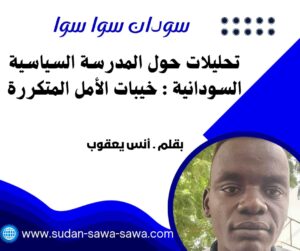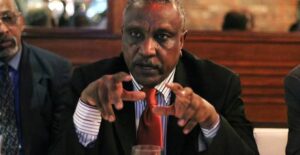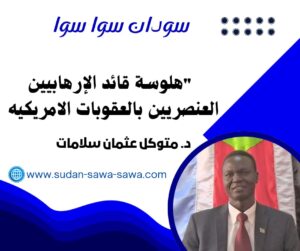Sudan Sawa Sawa: Shedding Light on Underreported Areas
“Analysis of the Sudanese Political Landscape: Repeated Disappointments”
Sudan: Sudan Sawa Sawa, February 1, 2025
By: Anas Yaqub
A simple reflection on the current state of Sudan in the rush of its history suggests that the political elites have been and continue to be far removed from the national interest and the needs of the Sudanese people, as well as the requirements of their times. This is evident in their deliberate political selfishness and, more prominently, in their failure to manage diversity, pluralism, and the wars waged by these elites to suppress and defeat opposing forces or unarmed citizens in various parts of Sudan. The consequences of their senseless wars and policies are reflected in the revolutionary forces that remain alive and committed to their noble revolutionary principles.
This is an attempt to bridge a gap or to provide a modest analysis of the repeated disappointments experienced by ordinary citizens who are suffering unprecedented hardships. Their dreams have been shattered, leaving them struggling for a livelihood and a safe haven in an unbearable situation for those who remain in the country. The plight of those who have fled and become refugees is even more dire.
From the depths of national spirit and in order to maintain the cohesion and unity of social components, it is essential to accept differences and coexist. We can not impose our beliefs on others, nor can we exploit our majority to act against minorities. The issue of human rights is crucial for peace, and it is vital to seek to calm emotions, resolve conflicts, and pursue changes and reforms that will lead to the salvation and liberation of Sudan from its current plight.
Sudan has turned into a large wrestling ring where Sunnis kill Shia, Shia kill civilians, and the government kills everyone at will until the fires of war subside. From this crucible, someone must emerge to carry the burden of rescuing what remains by establishing a social contract that allows us to catch up with the world and place Sudan on the path to growth and prosperity. This will ultimately satisfy both the Sudanese people and the successive governments, ensuring that everyone lives in harmony. The most notable feature of Sudan is the rapid political changes, which keep what we write and do not write open to various possibilities.
“What unites the Sudanese people in both countries is greater than the plans of the Islamists and their repressive apparatus”
Yasir Arman: Sudan Sawa Sawa, January 19, 2025
On January 17, Yasir Arman wrote on his Facebook page: “What unites the Sudanese people in both countries is indeed greater and more beautiful than the plans of the Islamists and their miserable, terrorist movement, along with their security forces that have targeted innocent citizens from both the south and the north with the same bullet and from the same person. This is a toxic scheme by criminal killing groups that have shed blood for 36 years without satisfaction or restraint. They do not wish for the well-being of either people and have destroyed the historical relations between the two countries- Sudan.
We all remember what Dr. Kamal Abid said: ‘We will not give any southerner an injection!’ and what Abdel-Hai Youssef stated at the peak of the December Revolution regarding Bashir, that Maliki jurisprudence permits the president to kill two-thirds of the subjects to maintain the rule of the Islamists! We must not allow those who have corrupted our past to ruin our future, for the future belongs to the Sudanese on both sides of the river. It will not be taken away by these murderous, criminal thieves who will not escape punishment.
Everyone must work for honorable brotherhood and not allow any schemes to destroy the bonds of love, culture, blood, and history between the two countries. We should not look through a keyhole but through the gateway of the future, history, and our great interests.”
“I wrote over two decades ago, before the separation of the south, on my Facebook profile, and I still retain the same profile today: ‘I was born in North Sudan, but both North and South Sudan have always occupied the same space in my heart and mind.’ This is what I believe today and will continue to believe tomorrow.
I condemn the killing of Southerners and demand accountability for these crimes. I call for the protection of all Sudanese people in our country, and for us to work together against war and for peace. Shame on the terrorist Islamic movement, the National Congress Party, their organizations, military apparatuses, and their special operations agencies. I urge all our people to join together so that we do not lose our country.
We must not allow the various plots and interests that seek to tear Sudan apart and destroy the unity of its people. We cannot permit the legitimization of killings based on identity, which would leave us divided and fragmented. We must stand against all those who seek to legitimize ethnic violence and employ weapons that oppress rather than liberate, that suppress rather than bring peace, freedom, and justice.
Glory to my country, Sudan.”
“Hallucinations of the Leader of Racist Terrorists Regarding American Sanctions”
Sudan Sawa Sawa, January 18, 2025
Dr. Mutwakil Osman Salamat
Several news outlets have leaked information stating that Abdel Fattah Abdel Rahman Al-Burhan, the commander of the Sudanese Armed Forces, will face American sanctions on Thursday, according to a diplomatic source speaking to Reuters. These American actions aim to penalize the leader of the racist terrorists for several reasons, the most significant being the targeting of civilians, civilian institutions, and residential areas by the Sudanese Armed Forces, delays in aid delivery, and the refusal to participate in peace talks last year.
There is also another very serious leak concerning the use of chemical weapons by the Sudanese Armed Forces in their warfare. Given the gravity of this topic, we will dedicate a separate article to it.
This situation has troubled the man and caused him concern, prompting a media figure from “The Human Sacrifice Miracles” on Al-Jazeera to advise him to address the media regarding the “potential” sanctions. He stated from Kabir Beika in Al-Jazeera State: “We have heard about sanctions that will be imposed on the army leaders, and we welcome any sanctions that serve the nation.” He clarified that “the state and the law are responsible for protecting the people and holding them accountable…”
This confused statement, in our estimation, arises from several reasons. Firstly, it aims to alleviate the psychological tension he experienced after hearing the news and to mitigate the shock among his terrorist elements in the armed forces and their allied militias, whose morale has collapsed. They have started disseminating videos in an attempt to hide their vulnerabilities from the eyes and minds of the Sudanese people and the shocked regional and international community regarding the ethnic cleansing that took place against the residents of the Kanabi area in the Gezira state after it was entered by the army and the allied militia led by “Abu Aqila Kekel,” without any significant battles following the withdrawal of the Rapid Support Forces from the area. Additionally, there is an effort to gain sympathy from certain regional and international powers, as well as from some ordinary citizens. The final reason for this confused statement, in our view, is the ongoing attempt to seek legitimacy for him and his group in Port Sudan and for a state that does not legally exist.
We have repeatedly emphasized that what Burhan and his group are trying to promote as a state does not exist according to the elements or pillars outlined in international law or constitutional theory. These elements include the geographical territory, which is divided between the areas controlled by the Sudan People’s Liberation Army led by Commander Abdulaziz Adam Al-Hilu, the territories under the control of the Sudan Liberation Army led by Abdel Wahid Nour, and the territories controlled by the Rapid Support Forces led by Mohamed Hamdan Dagalo “Hemeti.” As for the government, the Port Sudan group is a military coup group lacking constitutional legitimacy, which is why its membership in the African Union has been suspended. They are not the sole authority governing Sudan; there is a civilian authority for the new Sudan managed by the First Secretary, Commander Arno Ngutulu Lodi, and led by Commander Abdulaziz Adam Al-Hilu, which represents the entire Sudanese state. There are also civilian administrations in the areas controlled by Abdel Wahid Nour and Hemeti.
Moreover, the people’s representation is also divided. Since the sovereignty of states is represented by the people, who then delegate it to the government, there is no government in Sudan authorized by the Sudanese people to exercise sovereignty other than the civilian authority of the new Sudan. Consequently, there is no state with a government in the areas controlled by the army and its militias that can protect the citizens. Burhan’s statement is a reflection of his actions, as he and his militias and army have committed grave violations against the people, leaving them without safety and protection in the areas under his control. At the same time, state institutions—executive, legislative, and judicial—have historically failed to provide protection for citizens because the Sudanese citizen is their primary enemy.
As for the law that protects people and holds them accountable, it is a concept far removed from reality and the history of the troubled Sudanese state. This state was fundamentally established on the disregard for the will of the people and the lack of respect for the principle of the rule of law. The principle of impunity prevails, even when perpetrators commit serious crimes such as genocide, crimes against humanity, war crimes, or high treason, carried out by its army and militias throughout their time in power.
What can be said about the period when the state ceased to exist? The manipulation of the Sudanese people’s will regarding the identity of the state, as well as the presidency, the cabinet, other executive institutions, the parliament, and the judiciary, has led to crimes and violations for which their perpetrators have escaped punishment. The governments are unjust, discriminating against citizens, and therefore, the laws enacted by these governments are neither fair nor representative of all Sudanese people. These laws are based on a colonial legal framework, filled with provisions after the departure of the European colonizers, which was replaced by an Arabized colonizer, aiming to promote Arabism and Islam while protecting the rights and interests of the Arabized population.
The legislators do not adhere to the principles of impartiality, inclusiveness, equal citizenship, diversity, and respect for human rights and international treaties, which derive their legitimacy from the nature of a secular state. Consequently, these are laws of slavery and racism, designed to be applied selectively, such as the “Foreign Faces Law.” These laws are also enforced against certain political opponents who sincerely oppose the ongoing political, cultural, social, and economic dysfunction.
We previously warned the United States, the United Nations, Saudi Arabia, several European Union countries, the African Union, IGAD, and all nations striving to end the war in Sudan. On Thursday, September 18, 2024, former President Joe Biden urged both warring parties to return to the negotiating table, stating that halting the current wars does not equate to ending the wars in Sudan. Ending the wars requires addressing the historical roots of the underlying issues.
We also cautioned that you are dealing with a racially motivated group that has ruled Sudan since the departure of colonial powers. This group has completely failed in governance due to its continuous violation of agreements and pacts. They persistently seek to obstruct any attempts to address the root causes of the conflicts through ongoing military coups, preserving state structures that grant them privileges of monopolizing power, plundering resources, and imposing culture, religion, and language on the rest of the Sudanese population. This is evidenced by their killing of the Kanabi residents based on race, which is an extension of the ongoing ethnic and religious cleansing.
Despite most, if not all, Kanabi residents having converted to Islam due to the state’s physical and psychological violence and their long-standing presence in the region, this assimilation has not spared them from death due to their color, ethnic background, and language—not because of their affiliation with the Rapid Support Forces. The individual who accuses them was a commander of the Rapid Support Forces in Al-Jazeera state and is accused by local citizens of perpetrating the Wad al-Nour massacre. His forces committed acts of mass rape and sexual violence against women in the state while he led the military division responsible for combat operations before returning to fight alongside the army. This renders this inhumane, racially motivated group unfit to hold any responsibility for managing a diverse and multi-ethnic, cultural, and religious state.
The anticipated sanctions are considered a step in the right direction, with the hope that the African Union, IGAD, the United Nations, the European Union, and all humanitarian nations will take similar bold steps to pressure the parties involved. It is essential to listen to the voices of Sudanese people calling for peace, which can only be achieved by addressing the root causes of the Sudanese conflict that perpetuate the wars.
Introduction
Sudan has long been a nation at the crossroads of history, culture, and conflict. Yet, many of its stories remain untold or underreported, leaving critical events in the shadows. “Sudan Sawa Sawa” emerges as a transformative news and media platform, dedicated to amplifying voices from marginalized areas and highlighting the nation’s ongoing pursuit of democratic transformation. By providing a space for underrepresented narratives, this initiative bridges gaps in global media coverage and advocates for sustainable progress.
Alleviating the Media Silence
In many conflict zones or politically complex regions, global media outlets often struggle to provide consistent and nuanced coverage. Sudan, with its intricate social fabric and historical challenges, is no exception. “Sudan Sawa Sawa” takes a bold step toward addressing this issue. By focusing on underreported areas, the platform ensures that local voices are not only heard but are also preserved for posterity.
This mission is particularly vital in the Sudanese context, where the recent political turbulence—marked by coups, protests, and fragile peace agreements—has often been overshadowed by other global events. The platform works tirelessly to document these occurrences, giving them the attention they deserve while contextualizing them for broader audiences.
Empowering Local Voices
“Sudan Sawa Sawa” believes in the power of storytelling as a tool for change. Local journalists, activists, and citizens are at the heart of its operation. Through their firsthand accounts, the platform paints an authentic picture of the struggles and triumphs in Sudan.
This approach serves dual purposes. First, it creates a repository of real-time insights that counter misinformation and propaganda. Second, it empowers communities by showing them that their stories matter. For a nation like Sudan, grappling with systemic inequality and political unrest, such empowerment is crucial in fostering hope and resilience.
Advancing Democratic Transformation
Sudan has experienced a turbulent transition since the ousting of long-time leader Omar al-Bashir in 2019. While the revolution promised democratic reforms, the journey has been fraught with challenges, including military takeovers and economic instability. Against this backdrop, “Sudan Sawa Sawa” positions itself as a watchdog and advocate.
By spotlighting grassroots movements, youth-led initiatives, and policy shifts, the platform aims to inform and inspire action. Its reporting not only highlights the gaps in governance but also showcases innovative solutions implemented by Sudanese citizens. In doing so, it contributes to shaping a more accountable and inclusive political system.
Bridging the Global Divide
A key strength of “Sudan Sawa Sawa” lies in its ability to bridge the divide between local realities and global awareness. The platform tailors its content for diverse audiences, ensuring that both Sudanese citizens and international stakeholders stay informed.
For instance, its multimedia approach—featuring articles, documentaries, and social media updates—makes complex issues accessible to a wide audience. By collaborating with international organizations, “Sudan Sawa Sawa” also creates opportunities for Sudan’s stories to influence global discourse on human rights, democracy, and conflict resolution.
Challenges and Opportunities
Running a media platform in an underreported region is no small feat. Sudan’s ongoing conflict, limited infrastructure, and censorship pose significant challenges. However, “Sudan Sawa Sawa” views these obstacles as opportunities to innovate.
Through partnerships with local NGOs, digital tools for remote reporting, and training programs for journalists, the platform not only survives but thrives. These efforts also lay the groundwork for a stronger media landscape in Sudan, capable of sustaining its democratic ambitions.
Conclusion
“Sudan Sawa Sawa” represents more than a news platform—it is a beacon of hope and accountability for underreported regions. By shedding light on Sudan’s stories, it fosters understanding, empowers communities, and supports the nation’s journey toward democratic transformation.
In a world where media often overlooks marginalized voices, initiatives like “Sudan Sawa Sawa” remind us of the power of storytelling to spark change. By amplifying these vital narratives, the platform ensures that Sudan’s path toward peace and progress is illuminated for all to see.
